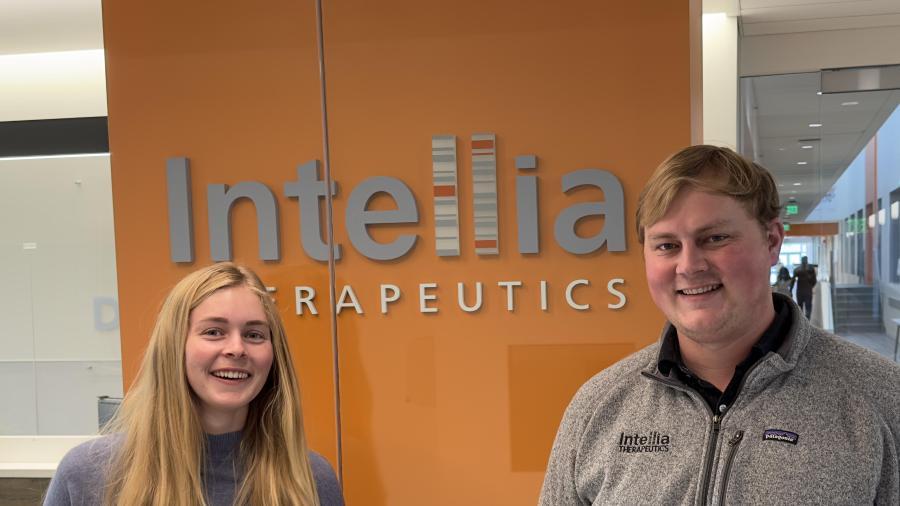Westmont Magazine Keeping Scientific Research All in the Family

By Sharon Savely Odegaard ’72
The vital field of genome editing benefits from the talents of a dynamic brother-and sister duo. BEN TRAPP ’15 and ELLEN TRAPP ’21 say their double major of biochemistry and biology at Westmont prepared them for their jobs at Boston based Intellia Therapeutics. Enthused about their careers, they admit that “work comes home a bit.”
While Ben and Ellen work closely together at Intellia, they serve in different roles. A senior automation engineer, Ben says he has “always liked gadgets,” and he deals with robots and software. He focuses on the tools the researchers and clinicians — like Ellen — use. How can he automate repetitive tasks? How can workflows be more efficient? How can tasks be accomplished more quickly?
Ellen performs amplicon sequencing. She processes thousands of samples weekly, aided by the tools Ben provides.
Ben loves what he does and appreciates the altruistic meaning of his work; the company’s mission is “transforming lives of people with severe diseases.” “Researching and testing new drugs already has a dramatic effect on people with a certain disease,” he says. “It’s exciting because we’ve changed the rest of their lives.”
In one project, Intellia is developing a treatment for amyloidosis, a rare and fatal disease that causes protein to build up in the body. “By making edits to the DNA in the liver, this new drug can eliminate a bad portion of the DNA,” Ben says.
Both Ben and Ellen say Westmont prepared them for their careers in science. Ellen especially appreciates being well-rounded. “I understood both problem-solving and communication,” she says. Ellen also enjoyed classes outside the realm of science, especially Professor Jesse Covington’s introduction to political science. “He made it fun,” she says. “And coach Russell Smelley poured a lot of wisdom into me.”
Nervous about tackling organic chemistry, Ellen credits Professor Amanda Silberstein with helping her succeed. “She was organized, and I was able to grasp the teaching,” Ellen says.
Professor Eileen McMahon McQuade gets kudos from Ben for her course in genetics. While it was difficult, her class showed him “a lot of cool aspects of science. She made science approachable.” Ben also mentions Professor Kristi Cantrell, with whom he spent a summer during college doing research. “Her experience in pharmaceuticals and biotech taught me that more career options are available in these fields than the more typical doctoral or medical school avenues,” he says.
The liberal arts education they received at Westmont encouraged Ben and Ellen to explore their interests in science or any other field. “We can learn about something just because it’s fascinating,” Ben says. He has taken a number of courses, some at Harvard University, that apply to his work, even though he’s not pursuing a degree.
Ben and Ellen want students to learn that science offers wonderful, fulfilling careers even for people without advanced degrees. Sometimes a college degree can lead to an intriguing job. Ellen’s connection with her brother helped her get on board at Intellia.
“I like the clinical side of my work, but what makes it enjoyable is knowing the bigger picture,” Ben says. “The work we’re doing at Intellia is helping people.” For this brother-and-sister team of scientists, helping others keeps them bubbling with enthusiasm about science, their work and life.
